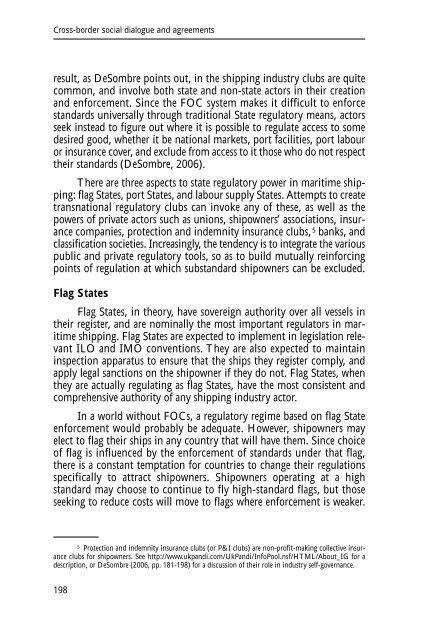CROSS-BORDER SOCIAL DIALOGUE AND AGREEMENTS: An ...
CROSS-BORDER SOCIAL DIALOGUE AND AGREEMENTS: An ...
CROSS-BORDER SOCIAL DIALOGUE AND AGREEMENTS: An ...
Create successful ePaper yourself
Turn your PDF publications into a flip-book with our unique Google optimized e-Paper software.
Cross-border social dialogue and agreements<br />
result, as DeSombre points out, in the shipping industry clubs are quite<br />
common, and involve both state and non-state actors in their creation<br />
and enforcement. Since the FOC system makes it difficult to enforce<br />
standards universally through traditional State regulatory means, actors<br />
seek instead to figure out where it is possible to regulate access to some<br />
desired good, whether it be national markets, port facilities, port labour<br />
or insurance cover, and exclude from access to it those who do not respect<br />
their standards (DeSombre, 2006).<br />
There are three aspects to state regulatory power in maritime shipping:<br />
flag States, port States, and labour supply States. Attempts to create<br />
transnational regulatory clubs can invoke any of these, as well as the<br />
powers of private actors such as unions, shipowners’ associations, insurance<br />
companies, protection and indemnity insurance clubs, 5 banks, and<br />
classification societies. Increasingly, the tendency is to integrate the various<br />
public and private regulatory tools, so as to build mutually reinforcing<br />
points of regulation at which substandard shipowners can be excluded.<br />
Flag States<br />
Flag States, in theory, have sovereign authority over all vessels in<br />
their register, and are nominally the most important regulators in maritime<br />
shipping. Flag States are expected to implement in legislation relevant<br />
ILO and IMO conventions. They are also expected to maintain<br />
inspection apparatus to ensure that the ships they register comply, and<br />
apply legal sanctions on the shipowner if they do not. Flag States, when<br />
they are actually regulating as flag States, have the most consistent and<br />
comprehensive authority of any shipping industry actor.<br />
In a world without FOCs, a regulatory regime based on flag State<br />
enforcement would probably be adequate. However, shipowners may<br />
elect to flag their ships in any country that will have them. Since choice<br />
of flag is influenced by the enforcement of standards under that flag,<br />
there is a constant temptation for countries to change their regulations<br />
specifically to attract shipowners. Shipowners operating at a high<br />
standard may choose to continue to fly high-standard flags, but those<br />
seeking to reduce costs will move to flags where enforcement is weaker.<br />
5<br />
Protection and indemnity insurance clubs (or P&I clubs) are non-profit-making collective insurance<br />
clubs for shipowners. See http://www.ukpandi.com/UkPandi/InfoPool.nsf/HTML/About_IG for a<br />
description, or DeSombre (2006, pp. 181-198) for a discussion of their role in industry self-governance.<br />
198
















